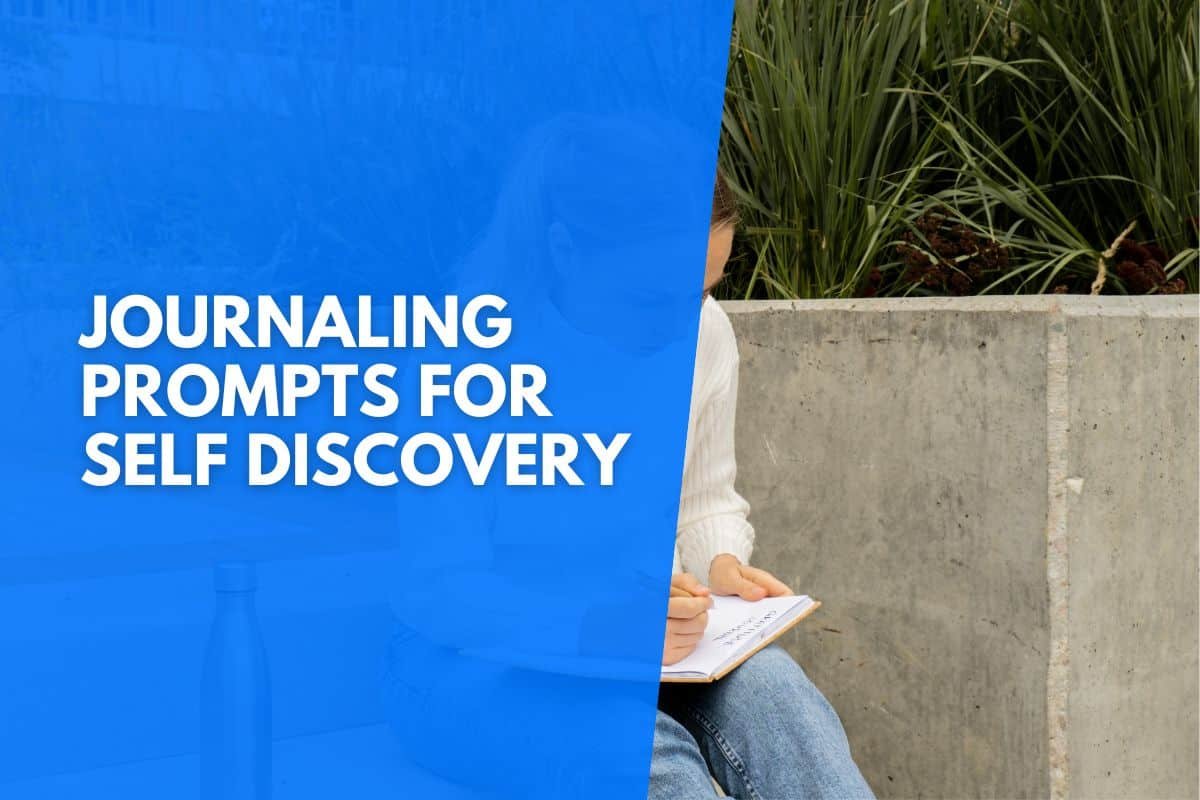Knowing who you are at your core and shaping your life’s paths according to your values and beliefs help you lead an authentic life. Authenticity will typically guide you towards positive, intrinsically motivated, socially aware activities – and happiness.
On the other hand, you might pay a high price for your self-ignorance, where you haven’t examined your feelings and desires and are at a loss for how to deal with them.
Journaling is the ideal way to get to know your deepest beliefs, fears, hopes, and desires in a safe, private space.
Journaling prompts for self-discovery:

Your True Self: Values
You can live more authentically if you know your values (all of them!) and can align them with your actions.
Many people need to learn what these are, and many people can’t name a good number of values, let alone identify these within themselves.
Fortunately, there are tools to help you. Follow the prompts below as a guide. Take your time with these. This is a meticulous endeavor, not unlike an archeological excavation:
- What is my favorite movie, TV program, or TV series? These are the three to five themes the movie, TV program, or TV series addresses
- What is my second favorite movie, TV program, or TV series? These are the three to five themes my second favorite movie, TV program, or TV series addresses
- What is my favorite book of all time? These are the two to three themes the book addresses
- The two to three themes that occur most in my favorite movies, TV programs, or TV series
- Why does the first common theme in my movies, TV programs, or TV series appeal to me?
- Why does the second common theme in my movies, TV programs, or TV series appeal to me?
- Why does the third common theme in my movies, TV programs, or TV series, if there is one, appeal to me?
- Why does the first common theme in my favorite book appeal to me?
- Why does the second common theme in my favorite book appeal to me?
- Why does the third common theme in my favorite book, if there is one, appeal to me?
- (Obtain a list of values. You can google “Core Values List.”) Looking at the two or three common themes I have previously identified, I can link these values to them
- Which values might I be surprised to find in my identified list? Looking at each one, what are the possible reasons for my surprise?
- Looking at my list of values, these jump out at me as being important. They resonate with me.
Your True Self: Beliefs
Beliefs are assumptions we make or an idea accepted without evidence.
Self-limiting beliefs stem from the same place: your brain wants to protect you from pain.
- These are my core beliefs about people or the world in general.
- What happened to me, or what did I witness to hold these beliefs?
- Taking the second core belief and having to defend it, what would I say?
- Taking the second core belief and having to defect the exact opposite, what would I say?
- I am forced to assume that everyone, including me, can be creative. What is the one thing I would need to do or learn that would feed this creativity?
- Which of the following common self-limiting beliefs do you subscribe to? Can you remember where this belief started (look back to when you were young as well): I am not clever enough; I will be found out; I am too old; I am too young; I will never be among the best; always the bridesmaid, never the bride; I will never get my dues.
- Take each limiting belief you are “guilty of” and think of a time when someone said something that now makes you feel as if you might have had it wrong.
- Take each limiting belief you are “guilty of” and think of a time when something small happened that now makes you feel as if you might have had it wrong.
- My beliefs about romantic love are:
- Which events happened in my life that led me to have these beliefs about romantic love?
- Asked by a friend to defend my first belief about romantic love, I will point out the following:
- Asked by a friend to defend the opposite of my first belief about romantic love, what would I say?

Knowing The Past: Childhood Wounds
Childhood wounds are also known as primal wounds. This is a complicated issue and could be very hard to deal with on your own.
Before you answer the prompts below, reflect on the following: When we are small, we are at the mercy of our caregivers, we are small and frail, and we can’t go anywhere because we don’t have a social network.
But more than anything else, we are emotionally vulnerable. When things happen, even small things like a grown-up raising her voice or arguing with another, we feel as if our earth trembles.
Or we think we are the cause of what is going wrong. When we are small, we don’t have the emotional capacity or the maturity to understand what is going on.
We are, therefore, all “emotionally damaged” to an extent. Journaling using these healing prompts can help us understand what happened to us.
- What was the one thing I remember that scared me when I was a little child?
- What was the thing I feared most when I was a pre-teen?
- What are the possible reasons for the thing I feared most as a pre-teen?
- How did I react to what was happening that made me so fearful?
- What was the thing I feared most when I was a teenager?
- What are the possible reasons for the thing I feared most as a teenager?
- How did I react to what was happening that made me so fearful?
- I had siblings and always thought they:
- This person was the adult I talked to or trusted the most when I was young, which is why.
- What made me happy when I was a pre-teen?
- What made me happy when I was a teenager?
- What did I want to be while growing up? Why did this inspire me?
- The most important thing I could tell the small me is:
Your True Self: Emotions
Some people are more emotional than others, which is perfectly fine.
Emotions help us lead vibrant and exciting lives, and to be able to name them helps us to manage them should they get out of control.
The psychologist Dan Siegel calls it “name it to tame it.” We get a chance to stand back, evaluate the emotion and decide how to deal with it. Get closer to the emotions you experience by following these prompts.
- The single thing I most regret having done or happening to me:
- How did I feel when I answered the previous prompt? Which other emotions could I feel arising in my body?
- When was the last time that I felt really happy? Who, if any, are the people who were with me?
- How did the people with me contribute the last time I felt happy to this feeling?
- Whether there were people present or not when I felt so happy, what made this time special?
- If I was asked to expand on the feeling of being happy, which other emotions can I use?
- The playlist of my top ten songs or pieces of music:
- Looking at my playlist, these are the emotions I experience when I look at the songs or pieces of music. (If you struggle to think of the feelings invoked, play the music from time to time and reflect on the emotions you are becoming aware of in your body. Then return to complete these prompts.)
- If I was banished to an isolated desert island, which one of my top ten songs or pieces of music would I take with me? And why is this?
- When was the last time I felt anxious?
- What was the reason for the anxiety?
- Which other time comes to mind when I felt anxious? Why did I feel this way?
- When was the last time I felt sad or depressed?
- What was the cause of the sadness?
- How did I try to overcome this feeling of sadness or depression?
- The last time I played just for the joy of it and without feeling self-conscious was:
- What made the above activity stand out? What were the emotions I distinctly remember?
- How can I bring more play into my life?

Emotional Health: Self-love
Journaling prompts for self-love can help us determine how much we can truly be friends with ourselves.
Learning to love ourselves is challenging, but it is essential for leading a fulfilling life. It is important that we stay on our own side and make self-love a priority.
Take some time to reflect on your level of self-love using the following prompts.
- The eight qualities I admire most about myself are:
- Why do I admire these qualities in myself?
- What have I learned so far in these journaling prompts that make me feel more empathetic toward myself (similar to how I would feel when I look at a picture of me as a small, vulnerable child):
- What have I recently accomplished that made me feel proud of myself?
- When did I last put my needs first? How did I feel?
- If I had to put my needs first now, in what way would I feel differently?
- What does self-love look like to me?
Emotional Health: Self-honesty
How difficult is it for you to be honest with yourself, to admit to certain less pleasant aspects of your behavior or attitudes?
It isn’t easy to obtain clarity, feel at peace or follow the right path if you are not candid with yourself.
Use these prompts to reflect on your self-honesty.
- When was the last time I felt envious of a friend? How did I experience this emotion?
- Have I tried to manage this feeling of envy? What did I do that was helpful? If nothing, what could I have done that would have been helpful?
- When was the last time I thought I acted foolishly? How did this make me feel?
- If someone criticizes something I have done, do I listen as open-mindedly as possible, or do I shut down and think about it for days as a personal attack?
- Reflecting on the previous prompt: is my reaction to the criticism helpful? Why do I feel it is or is not?
- Have I gotten better at dealing with criticism since my young, inexperienced days? In what way?
Emotional Health: Communication
When we are in good emotional health, we can say how we feel in a calm and well-thought-through manner. If we don’t, we tend to shut down or throw tantrums.
Use the prompts below to help you reflect on your communication skills.
- What happened the last time I felt truly humiliated?
- The reason for the humiliation could relate to these core values of mine:
- The last time I felt humiliated, this is how I reacted:
- There is another way I could have reacted to the humiliation. How does this look, and would it be effective in the long run?
- When was the last time I overheard people saying something negative about me or was told about it by a friend?
- How did I feel about hearing what was said?
- How did I deal with something that was said about me? Was this helpful?
- When did I feel used or abused last?
- How did I deal with feeling used or abused? Was this approach helpful?

Your True Self: Life Purpose
Life purpose is having a set of exciting goals for your life, a reason to leap out of bed every morning, and eager to start the day.
Knowing who we are at our core makes it easier to understand our purpose and what would give our lives meaning.
- The most important thing I could tell an older version of myself is:
- What will I do to achieve the most important goal that I still need to succeed?
- I will have to take the following actions to achieve the second and third most important goals I haven’t achieved yet:
- I am forced to take a complete break from my job or my retirement. Here is the first thing I would do:
- I am forced to take a complete break from my job or retirement. Which activity will make me the happiest?
- How do the values I have listed play out in my life? (Examine all the values you have listed as being important. An example of a value could be “Learning” and your goal of completing one Udemy training course every two months.)
- Which steps will I take to live closer to the values I hold dear? (“Kindness” could be an example of a value, and doing a small act of kindness every day, or every week, could be an example of living this value.)
- If I try to live in the moment and not think of the past or the future, what is something practical I could do to remind myself during the day that this is the only moment I am guaranteed?
- Being as honest as I can with myself: Am I living my best life? If not, what will I do to work towards that satisfactory state?




